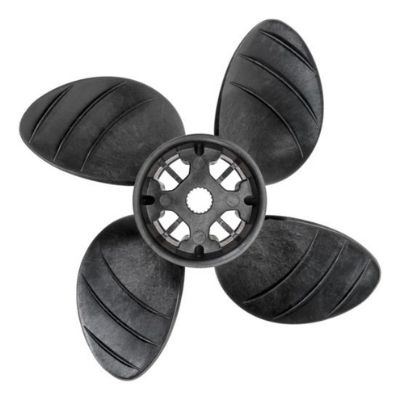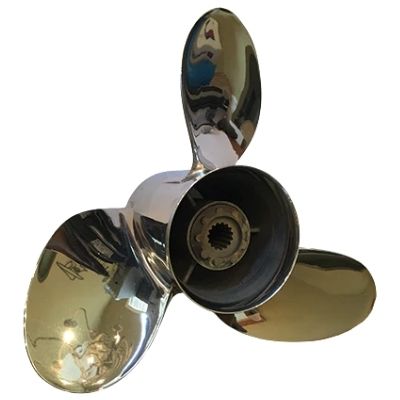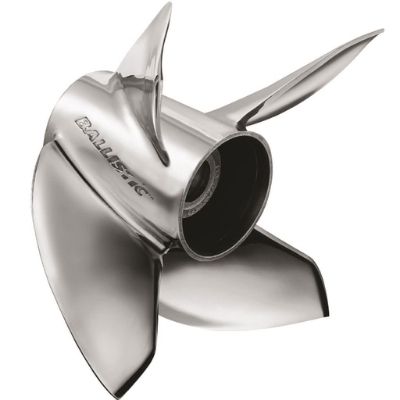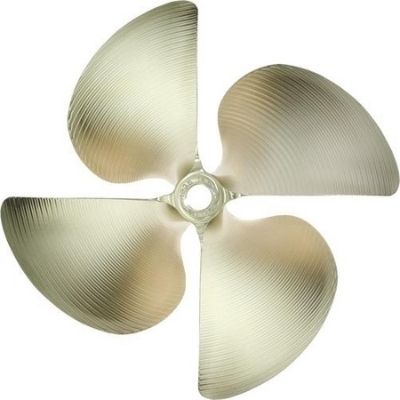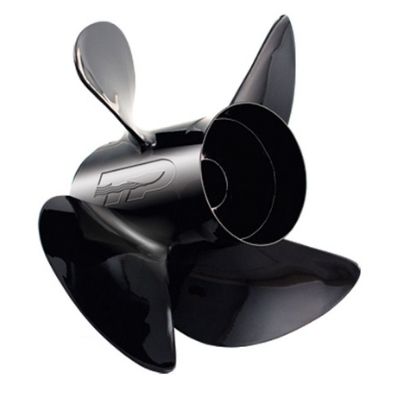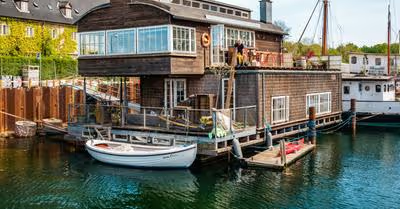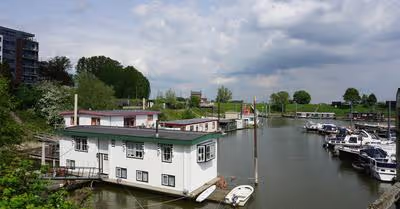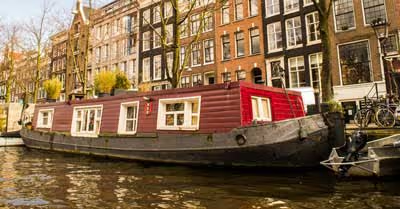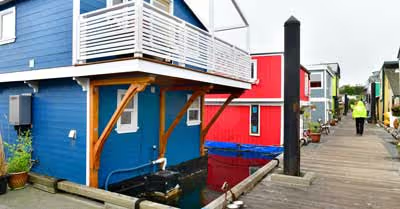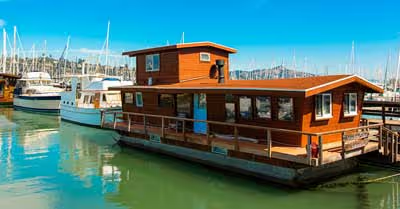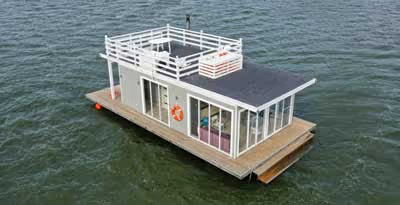
One of the most important and overlooked houseboat parts is the propeller. With the right prop, you can save fuel and improve handling.
The best houseboat props are Piranha Propellers, Propco improved OEM replacement propellers, Michigan Wheel Ballistic performance propellers, ACME four-blade propellers, and Turning Point Hustler propellers.
In this article, we’ll carefully review five of the best propellers and propeller makers for houseboats. We’ll go over the benefits and features of each, along with the shaft and horsepower compatibility when available. We’ll also cover the differences between propeller types and how to choose the right prop for your houseboat.
We sourced the specifications used in this article directly from each propeller’s distributor. We also referenced trusted propeller guides for pitch and blade count recommendations.
What Kind of Propellers do Houseboats Use?
Generally speaking, most houseboats use standard propellers that you also find on other powerboats. That said, there’s a huge variety of propellers on the market today with minor characteristics that make a world of difference. Houseboat designers usually favor propellers that produce a lot of thrust, as there’s a whole lot of boat that needs to move through the water.
Types of Propellers
The easiest way to categorize propellers is by blade count. Two-blade, three-blade, and four-blade propellers are the most common on all recreational boats. Propellers with more than four blades are usually found only on commercial and industrial applications, such as ferries, cargo ships, and warships.
The most common propeller found on houseboats is the standard three-blade model. Two-blade propellers, while once common on recreational boats, have fallen out of favor due to high-RPM gas and Diesel engines and new science on propeller efficiency.
Propellers are also divided by blade pitch. You can picture propeller pitch as the amount the prop would move forward if it were spinning alone underwater. Pitch is determined by the thrust and angle of the blades. You can see the effect by slowly unscrewing a screw—the aggressiveness of the threads determines how many times you have to turn it to back it out.
Controlled and Variable Pitch Propellers
If you spend a lot of time in the marine world, you’ll certainly hear of controlled and variable-pitch propellers. These propellers have an adjustable pitch, which changes automatically or manually based on speed and conditions. These propellers are more efficient as they can adapt and find the perfect pitch for a given scenario.
Houseboats very rarely utilize variable pitch propellers, as they’re not large enough for it to matter. Houseboat owners aren’t concerned about saving 0.10% of their fuel, as these numbers don’t matter nearly as much on the lake as they do for a large cargo vessel sailing the world’s oceans.
How to Choose a Propeller for a Houseboat
Choosing a propeller for your houseboat isn’t always so clear-cut. There are a few factors to consider, including horsepower, engine type, desired handling characteristics, and dimensions.
First, be sure the propeller you want will actually fit your engine. You can find the shaft type and diameter online or in your spec sheet. Also, make sure you have enough clearance for your new propeller. Divide the prop diameter in half and measure the distance from the center of the shaft to the nearest obstacle, and leave sufficient room for error.
Also, consider the power characteristics of your engine. Is your engine a torquey diesel with lots of power at low RPM, or do you run a snappy gasoline engine that prefers higher RPM? These factors will help you determine what pitch and blade count will be most efficient.
Best Propellers For Houseboats
Variable pitch propellers aren’t necessary on your houseboat. However, other kinds of propellers can provide a noticeable improvement in speed and fuel economy and for an affordable price. Here are five of the best propellers for your houseboat and how they can make your next voyage better and more efficient.
1. Piranha Propellers
Picture of Piranha Propellers
Piranha propellers have recently made the news in the boating world, and they offer something that previous propellers never had—easy repair and drivetrain protection. These propellers can be repaired without costly professional labor, and they protect your houseboat’s delicate components from common damage.
Here’s a scenario that’s all too common for house boaters. You load up the boat and head out on the water and finally find that perfect spot to pull up on the beach—but your prop hits a rock close to shore, and you’re in for a world of hurt. Almost every houseboat propeller has battle scars from unseen underwater obstacles, and the cost to repair the damage can easily reach thousands.
But Piranha developed something different that eliminates the risk almost entirely. Piranha propellers use composite blades, which can be individually replaced in the event of a prop strike. Composite blades are extremely strong but designed to shear off evenly to spare your drivetrain from a damaging shock.
And in the event of a prop strike, you can add a replacement blade on the spot—no need to hire a boatyard for expensive metalwork. And best of all, these propellers are available in many types, shaft sizes, and shapes. This means you’re likely to find one that fits your houseboat without any major modification.
Piranha propellers also feature proprietary “hydro bites” which run along the length of the blade faces. These thin bulges reduce vibration and increase the controllability of the prop, which is especially important on large and heavy houseboats.
You can purchase a Piranha propeller from the company’s website. Prices vary, so be sure to use their Prop Finder tool to select the proper size, shaft type, and pitch.
2. Propco Improved OEM Replacement Propellers
Picture of a Propco Improved OEM Replacement Propeller
Propco is one of America’s leading suppliers of propellers made specifically for houseboats. These propellers are designed to fit like OEM replacements on common houseboat engines, such as V6 and V8 inboard marine engines and Mercury, Johnson, and Evinrude outboards.
Most houseboats came from the factory with standard three-blade propellers, which have a relatively large footprint. This is because large props are more efficient at propelling big, flat-bottom boats like houseboats. Most houseboats don’t plane, which is why you won’t find too many speed boat propellers on them.
Propco sells propellers for virtually all major makes and models of houseboats, and most of them will fit perfectly right out of the box. They make propellers for most sub-models made by Evinrude, Johnson, Honda, Mercury, Yamaha, Volvo, Mercruiser, Spirit, Suzuki, Nissan, Tohatsu, Mariner, and others.
Propco propellers fit on OEM applications, but they’re not purely OEM parts. Propco designed and patented a special Reverse Hook Cup, which helps increase the effectiveness of reverse thrust and reduces stopping distances.
Propco marine propellers are a perfect replacement for your houseboat. If you have the wrong propeller, or if you accidentally scrape up or damage your factory prop, you can order a brand new (and correct) replacement from Propco. Plus, you’ll gain better control thanks to their patented Reverse Hook Cup.
You can purchase Propco propellers from their website. Prices vary based on make, model, and propeller type.
3. Michigan Wheel Ballistic Boat Propeller
Picture of the Michigan Wheel Ballistic Boat Propeller
But what if you have a V-bottom houseboat and lots of power? Though it’s not super common, some houseboats can lift their bows and travel at speed. That’s where the Michigan Wheel Ballistic propeller shines, and it can greatly increase your forward thrust.
This polished four-blade propeller closely mimics props used on inboard racing boats, which are designed to reduce cavitation and increase efficiency at high RPMs. The blades of this propeller are pointed outward, which helps blast a forward jet of water and direct it confidently.
The blade camber also helps lift the bow out of the water at speeds. And while most houseboats won’t actually get up on plane, they do become more efficient when the bow rises ever so slightly out of the water. This effect is more pronounced on V-bottom houseboats.
This propeller can help your boat achieve higher speeds but also increase your maneuverability. It’s designed for V6 Yamaha engines, which some houseboats have installed from the factory. It’s made of stainless steel for corrosion resistance and strength, promising years of trouble-free use in and out of the water.
The Michigan Wheel Ballistic prop has a 13 3/4” diameter, a pitch of 25, and fits on a 15-tooth spline shaft.
You can purchase a Michigan Wheel Ballistic propeller from Deep Blue Yacht Supply for $475.99.
4. ACME 1235 Four-Blade Propeller
Picture of the ACME 1235 Four-Blade Propeller
Many boat owners swear by four-blade propellers, as their efficiency at broad RPM ranges is well known. These propellers are surprisingly good at moving large boats through the water, and they’re also highly controllable without an aggressive pitch.
The ACME 1235 propeller was designed for wake boats, but it’s increasingly popular on larger vessels. It can be used as a single prop or in tandem on dual-prop houseboats, and it’s durable enough to last for many years. The propeller measures 14.5” by 14.25”, and it fits a 1 1/8” keyed propeller shaft. It is configured for left rotation.
This propeller was designed for go-fast boats, and it works best for smaller houseboats with high-RPM gasoline engines. It’s made with a corrosion-resistant material, which won’t rust or degrade rapidly as some cheaper propellers will. This premium ACME propeller is highly rated as well.
You can buy an ACME 1235 from WakeMakers for $535.90, but be sure to check the fitment on your boat before purchasing.
5. Turning Point Hustler Propeller
Picture of the Turning Point Hustler Propeller
Sometimes, all you need is an affordable and well-designed propeller. The Turning Point Hustler is a highly-rated and excellent option and the lowest-priced prop on our list. This propeller measures 15 inches across and is made of high-quality coated aluminum.
Aluminum propellers are known for their lightweight and corrosion resistance. They’re rigid and strong—though not quite as robust as steel. However, many people assert that aluminum propellers are less likely to damage your drivetrain in the event of a prop strike.
This Turning Point propeller is well designed and large enough for most houseboats. Its blades are made from special aluminum that’s rigid and doesn’t flex, which increases efficiency. The added strength comes from Turning Point’s special processes, which increases metal density over standard aluminum props.
This propeller is rated for 90 to 300 horsepower engines, and it’s compatible with a 4 3/4” Gearcase hub system.
The Hustler propeller features a five-step black powder-coated finish, which protects the metal from wear and sheds marine growth. You can purchase a 15” Turning Point Hustler propeller from West Marine for just $154.99.



